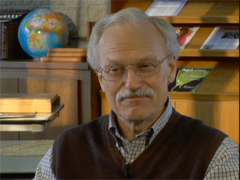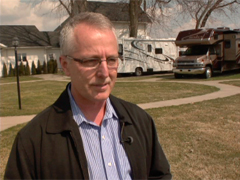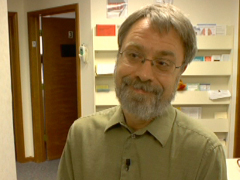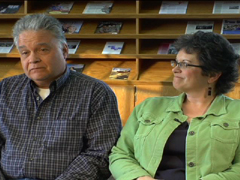In This Episode << SLIDE LEFT TO SEE ADDITIONAL SEGMENTS
Church Aid in Elkhart
BOB ABERNETHY, anchor: Now, a special report on religion and the economy. According to new figures from the U.S. Labor Department, more than six million Americans are now receiving unemployment benefits. Every metropolitan area in the country has seen a rise in unemployment rates over the last year, and the biggest jump was in Indiana’s Elkhart County. Kim Lawton went to Elkhart to find out how the religious community there is responding to the crisis.
KIM LAWTON: In Goshen, Indiana, just outside Elkhart, it’s the annual Family Fest at Bethany Christian Schools. Usually, it’s a time of joyous community celebration. But this year there was a new note of anxiety as the area reels from one of the worst unemployment crises in the country.
ALLAN DUECK (Principal, Bethany Christian Schools): People are recognizing this as a widespread need and know that “there but for the grace of God go I.” It could be me tomorrow or my family member, and so I think there’s a real sense of pulling together in ways we can.
LAWTON: This is RV country, where more than 60 percent of the nation’s recreational vehicles have been manufactured. But in tough economic times when gas prices are unpredictable, when people aren’t buying luxury items and when banks are restricting loans, the RV industry has collapsed. Factories here have closed or made drastic cutbacks, and the ripple effect is touching virtually everyone.
According to the Indiana Department of Workforce Development, since the beginning of this year the unemployment rate in this area has jumped to nearly 20 percent. That’s well over twice the national unemployment rate, and many believe the rate here is actually much higher, because the official numbers don’t include those who don’t file for unemployment benefits. In this area that includes large numbers of laid-off undocumented immigrants and Amish people who took factory jobs when they couldn’t make a living on their farms.
Derald Bontrager is president and COO of the Jayco RV company, which his parents started 41 years ago on his family’s farm. At Jayco’s peak two years ago, they were producing nearly 40,000 campers a year. Now they’ve had to cut that in half.
DERALD BONTRAGER (President and COO, Jayco): It’s a gut-wrenching experience to go from 2,200 employees down to 1,100, particularly in this environment, because you know that each one of those employees you lay off, that the chances of finding any meaningful employment in the near future is almost non-existent.
LAWTON: Bontrager, who is a leader in his local Mennonite congregation, says he’s dealing with a difficult moral equation.
Mr. BONTRAGER: In many cases, the people that we’re no longer able to employ are the same people that I go to church with on Sunday. I see them at the basketball games on the weekend; I see them at the restaurants. But you really have to try to separate that from knowing that we have a real obligation to make sure that we survive as a company in this environment, because we still are employing 1,100 people.
LAWTON: Bontrager says he’s relying on his faith.
Mr. BONTRAGER: You need to draw strength from somewhere, and I can’t think of anywhere else I’d rather draw strength from than God.
LAWTON: In this overwhelmingly Christian community with a significant Mennonite population, churches are being called upon more than ever to help meet physical and spiritual needs. One of the most prominent efforts is Church Community Services, a ministry supported by Mennonite, Catholic, mainline Protestant, and evangelical congregations. CCS has several programs, including a food pantry that is seeing all-time highs in the number of requests. They also provide emergency assistance to people who can’t pay for rent, utilities, and prescription medicine. Dean Preheim Bartel is executive director.
DEAN PREHEIM BARTEL (Executive Director, Church Community Services): To me, it’s a way of Christians actually putting their hands and their feet to what they believe. So it’s not just something in their head, but it’s something they are actually doing. They’re putting their heart and soul into it.
LAWTON: The needs are now so great CCS is moving to a bigger space to better handle the situation. Resources are being stretched thin. The agency has been seeing between 300 and 400 new clients every month. Many have worked their entire lives and never needed outside help.
SHARLEE MORAIN (Volunteer, CCS): And these people, they’ve not been in the system before. They just got laid off, and they’re, like, “Ugh, I don’t know what to do,” and the system just beats you up.
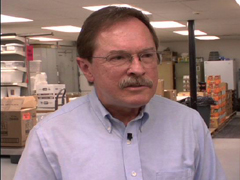
Dean Preheim Bartel |
LAWTON: The agency is sponsoring a job-training program for women called Soup of Success or SOS. It’s a holistic project that teaches women how to be good employees as they work in a small business packaging dry soup and cookie mixes into gift baskets. They learn life skills as well as job skills. Preheim Bartel says through it all CCS is trying to instill hope amid tough times.
Mr. PREHEIM BARTEL: Sometimes as an agency we can’t provide the tangible things people need, but what we can do is we can treat them with dignity and respect, and we can provide them with an atmosphere that’s hopeful.
LAWTON: Requests are also dramatically up at the Maple City Health Care Center, which provides sliding scale discounts for people who can’t afford medical care. Until now, they’ve always required patients to pay at least 10 percent of their costs.
Dr. JAMES GINGERICH (Family Practice, Maple City Health Center): When you start having families come in where the kids are only really getting meals at school for free lunches and breakfasts, and they’re choosing between food and healthcare, a 90 percent discount doesn’t cut it.
LAWTON: The health center has begun asking patients to volunteer at a local charity in exchange for $10 credit toward their medical bills. Dr. Gingerich says the program has been especially meaningful for the area’s growing number of unemployed Latino immigrants, many of whom are undocumented.
Dr. GINGERICH: Those people don’t have access to food stamps. They don’t have access to unemployment. They don’t have a safety net that other unemployed people do, and they’re often socially much more isolated because they don’t — they’re immigrants. They don’t have generations of connections in the community.
LAWTON: The trickle-down effect of the unemployment crisis is hurting businesses and nonprofits across the board. Bethany Christian Schools is a Mennonite school for about 280 students in grades 6 through 12. They’ve been trying to provide tuition help so unemployed families can keep their kids in the school. Bethany’s main fundraiser is an auction at the annual Family Fest. People donate items to be auctioned off, such as handmade quilts and furniture. This year’s event fell short of what they made last year. Principal Allen Dueck says the school faces a tight budget.
Mr. DUECK (Principal, Bethany Christian Schools): Teachers are looking at a zero increase this year, and we hope that will be enough to make things work. We may have to reduce staffing a little bit, depending on how enrollment shakes down for next year.
LAWTON: Churches, which support these community ministries, are facing their own budget shortfalls at a time when they are being asked to do more. Many congregations have established job counseling programs and support groups for the unemployed. Church leaders say the situation has taken a heavy spiritual toll.
At Elkhart’s Associated Mennonite Biblical Seminary they’re teaching future pastors how to counsel people affected by the crisis. Seminary president Nelson Kraybill says it starts with listening.
NELSON KRAYBILL(President, Associated Mennonite Biblical Seminary): You don’t come with quick and easy answers, and anyone who does, saying, “Well, this is what you ought to do” or “This is where you’ve made a mistake” — if you start with that I think you have defeated the entire purpose of the pastoral encounter.
LAWTON: Rick Yoder was laid off in September after working for a major RV manufacturer for 25 years. He’s in a church support group.
RICK YODER: Some people are executives. I come in as a laborer, forklift driver, truck driver, and we all say the same things. It’s about our identity, our livelihood, and changing. It’s the hardest thing to do.
JOY YODER: It’s probably the biggest challenge for me. I pray a lot, and I journal a lot, and it fluctuates from day to day, because I’m the main bread winner now, and I’ve never been in that role before.
LAWTON: Rick’s wife, Joy, works in the kitchen at Bethany Christian Schools, so she gets a discount to help with their daughter Jama’s tuition. But she doesn’t earn enough to cover all the family’s bills. Church friends have stepped in to help.
Mr. YODER: Right away some people come to me from our Sunday School class and said, “We know you need a roof on your house, and we want to do something.” That was so hard to accept, but I had to. But, you know, you do, and someday I’ll be on the other end giving.
Ms. YODER: We are used to giving and helping needy people here, and I think that’s been one of the biggest struggles, but also an area that I’ve had to learn to — the people want to help, and to say no you’re hurting them, and you’re taking that gift away from them.
LAWTON: Laid-off executive Michael Stevens says unemployment has made his faith stronger. A cradle Catholic, he’s spending more time at church and in prayer. He believes God will provide him the right job at the right time.
MICHAEL STEVENS: Even though it’s devastating to lose your job, as one door closes another one opens, and people should really embrace that and pray to God about that and look to go into that next open door, because that might be the door that he’s calling you to.
LAWTON: Kraybill says the entire community is learning important spiritual lessons.
Mr. KRAYBILL: When I have my bank account and my retirement and secure employment and my mortgage pretty well paid off, it’s pretty easy for me to get spiritually smug and think I don’t need God, and it’s in the people around us who are the most vulnerable where we are going to see the face of God.
LAWTON: Despite all the bad news, local leaders say faith and a strong community spirit are prevailing.
Mr. BONTRAGER: We’re still a very vibrant community, and people are committed to making it work—and we’re not going away.
LAWTON: They say that spirit will get them through this crisis. I’m Kim Lawton in Elkhart County, Indiana.

